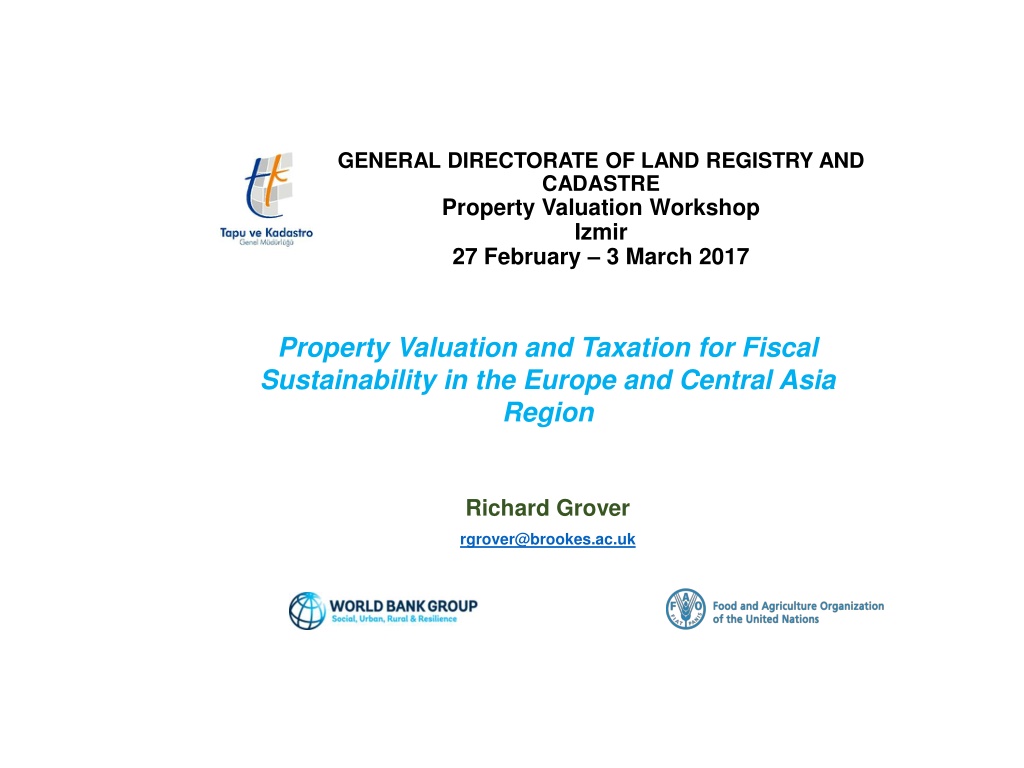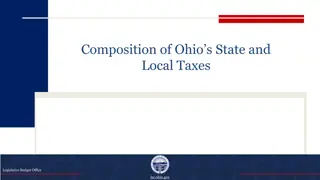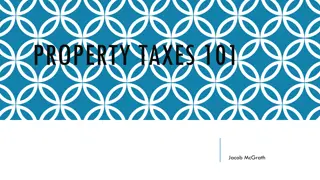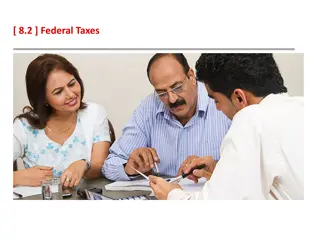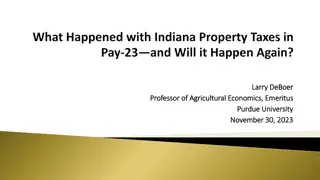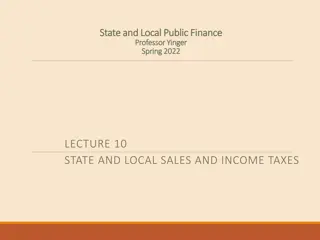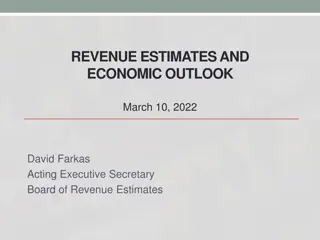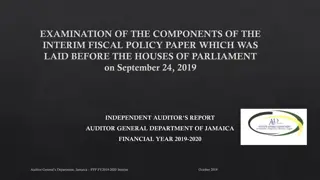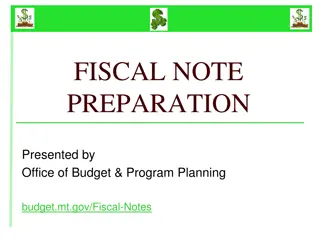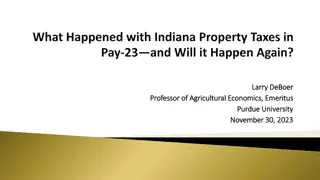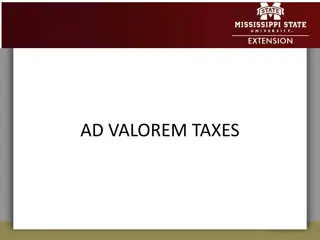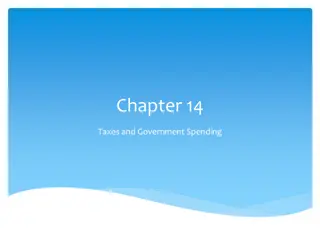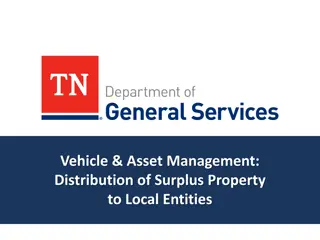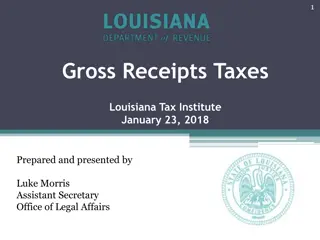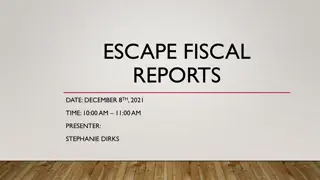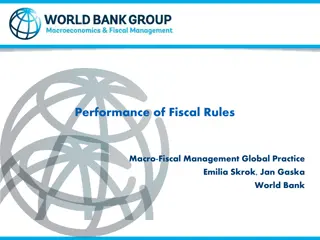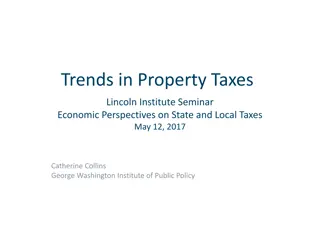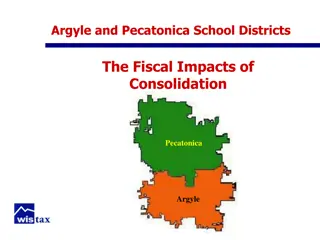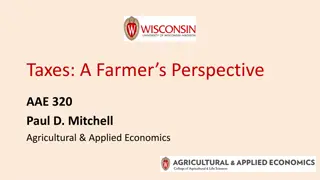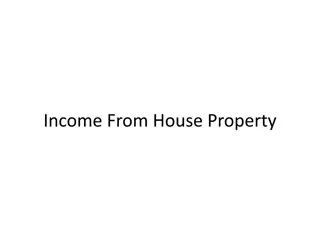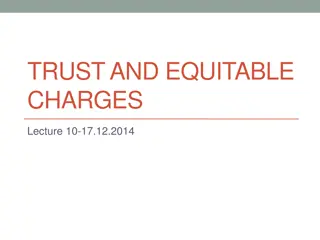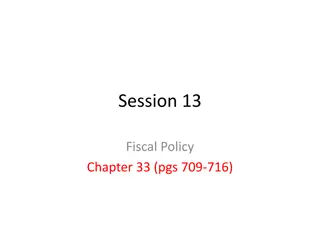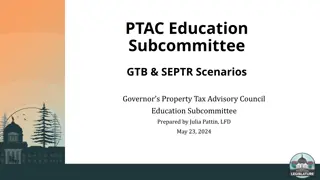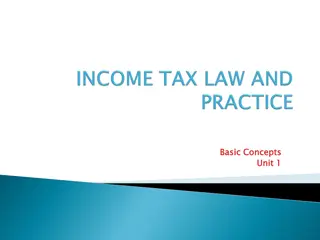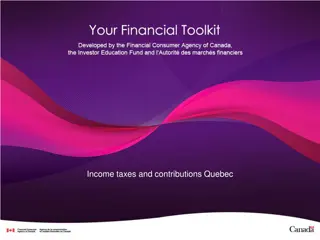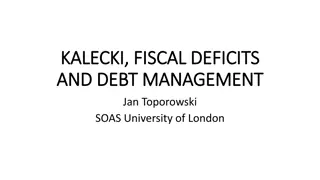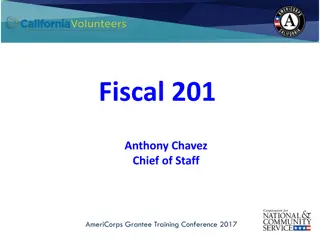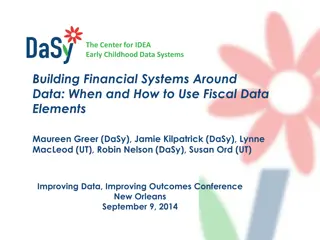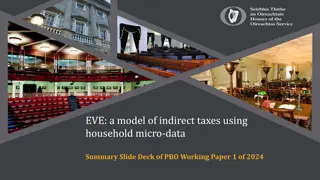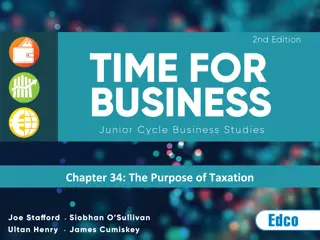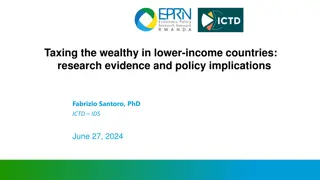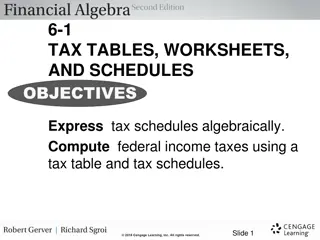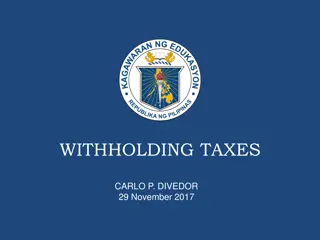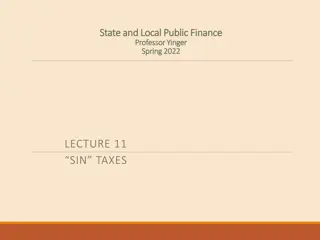Importance of Recurrent Property Taxes for Fiscal Sustainability
Recurrent property taxes play a crucial role in enhancing fiscal sustainability by reducing dependency on inter-governmental transfers, increasing local government accountability, and promoting equity in taxation. This article discusses the benefits of recurring property taxes, emphasizes the need for their implementation, and compares Turkey's relatively low utilization of property taxes to the OECD average. By leveraging property taxes strategically, governments can create a more stable revenue stream and address economic challenges effectively.
Download Presentation

Please find below an Image/Link to download the presentation.
The content on the website is provided AS IS for your information and personal use only. It may not be sold, licensed, or shared on other websites without obtaining consent from the author. Download presentation by click this link. If you encounter any issues during the download, it is possible that the publisher has removed the file from their server.
E N D
Presentation Transcript
GENERAL DIRECTORATE OF LAND REGISTRY AND CADASTRE Property Valuation Workshop Izmir 27 February 3 March 2017 Property Valuation and Taxation for Fiscal Sustainability in the Europe and Central Asia Region Richard Grover rgrover@brookes.ac.uk http://www.fao.org/fileadmin/templates/faoweb/images/FAO-logo.png
Merits of recurrent value Merits of recurrent value- -based property taxes based property taxes Suitability as local taxes as fall on immobile assets it is clear which assets fall within a jurisdiction Reduces local governments dependency on inter-governmental fiscal transfers at a time when many governments are under fiscal strain Increases accountability of local governments to citizens Helps to counter tax avoidance by multi-national companies and tax erosion resulting from globalisation profits can be reduced by transfer pricing but property cannot be hidden Reduces reliance on income, profits and sales taxes and social security contributions and their distorting effects on work and investment Taxes wealth helps promote equity in taxation by reducing tax burden on low income groups coming from income and sales taxes Helps counter inter-generational wealth inequalities http://www.fao.org/fileadmin/templates/faoweb/images/FAO-logo.png
Turkey has relatively high dependence on sales taxes and relatively low use of income and property taxes Source: OECD (2016), Tax levels and tax structures, 1965 2015 , in Revenue Statistics 2016, OECD Publishing, Paris, DOI: http://dx.doi.org/10.1787/rev stats- 2016-6-en-fr http://www.fao.org/fileadmin/templates/faoweb/images/FAO-logo.png
Property taxes as percentage of Gross Domestic Product (GDP) Property taxes as percentage of Gross Domestic Product (GDP) Turkey 1.4% OECD average 1.9% 4.5 4.0 3.5 3.0 Turkey below average use of property taxes 2.5 2.0 1.5 1.0 0.5 Source: OECD (2017), "Revenue Statistics: Comparative tables", OECD Tax Statistics (database). DOI: http://dx.doi.org/10.1787/d ata-00262-en 0.0 Iceland Turkey Israel United States Canada Finland Norway Australia Austria France Hungary Italy Latvia Chile Denmark Korea Mexico Netherlands Poland Greece Spain Germany Ireland Slovak Republic Czech Republic Belgium Japan Luxembourg New Zealand Slovenia Switzerland Estonia Portugal Sweden OECD Average United Kingdom http://www.fao.org/fileadmin/templates/faoweb/images/FAO-logo.png
Recurrent property taxes as percentage of GDP Recurrent property taxes as percentage of GDP Turkey 0.3% OECD average 1.1% 3.5 3.0 2.5 Turkey significantly below OECD average 2.0 1.5 1.0 0.5 Source: OECD (2017), "Revenue Statistics: Comparative tables", OECD Tax Statistics (database). DOI: http://dx.doi.org/10.1787 /data-00262-en 0.0 Canada Finland Iceland Norway Turkey Austria France Latvia Mexico Chile Denmark Israel Poland Spain United States Australia Greece Ireland Italy Hungary Netherlands Korea Belgium Germany Japan Luxembourg Portugal Slovak Republic Slovenia Czech Republic Estonia New Zealand Sweden Switzerland OECD Average United Kingdom http://www.fao.org/fileadmin/templates/faoweb/images/FAO-logo.png
Taxes on financial and capital transactions as percentage of GDP Taxes on financial and capital transactions as percentage of GDP 1.8 Turkey 1.1% OECD average 0.4% 1.6 1.4 1.2 Turkey significantly higher than OECD average. Issue of distorting impact of property transfer taxes on property market 1.0 0.8 0.6 0.4 0.2 0.0 Iceland Turkey Israel United States Canada Finland Norway Australia Austria France Hungary Italy Latvia Mexico Chile Denmark Korea Netherlands Poland Spain Greece Ireland Slovak Republic Czech Republic Germany Belgium Japan Luxembourg New Zealand Portugal Slovenia Estonia Sweden Switzerland OECD Average United Kingdom Source: OECD (2017), "Revenue Statistics: Comparative tables", OECD Tax Statistics (database). DOI: http://dx.doi.org/10.1787/dat a-00262-en http://www.fao.org/fileadmin/templates/faoweb/images/FAO-logo.png
Sub-national expenditures as a percent of GDP, 2010: Turkey and EU Local government expenditure is low relative to European norms Local administration sector heavily reliant on transfers, government aid and donations. Enterprise and property salesdominate municipalities own source revenues Taxes and fees are relatively unimportant. Is this sustainable as urbanisation slows down? Source: World Bank (2014), Rise of the Anatolian Tigers: Turkish Urbanization Review, Report Number 87180-TR
So where do the problems lie So where do the problems lie and can they be overcome? and can they be overcome? World Bank/ FAO knowledge project in 2014/15 9 case studies: Albania, Kazakhstan, Lithuania, Moldova, Netherlands, Poland, Serbia, Slovenia, Turkey from Europe and Central Asia Region Case studies published in Land Tenure Journal, Issue 2/2015 (2016), http://www.fao.org/3/a-i5429t.pdf Range of countries from those who had implemented successful value based property tax reforms to those experimenting with pilot studies Lithuania successful introduction Moldova good system but roll out incomplete and no revaluations - Slovenia and Poland good systems but implementation blocked Serbia, Turkey, Albania and Kazakhstan at various stages in experimenting with mass valuation Role of the Netherlands as a control successful system of value-based property taxation with annual revaluation and multiple usage of assessments by public bodies devolved assessment by municipalities with standards set by central body http://www.fao.org/fileadmin/templates/faoweb/images/FAO-logo.png
Land Tenure Journal, Issue 2/2015(2016) Thematic issue on property valuation and taxation in Europe and Central Asia http://www.fao.org/3/a-i5429t.pdf Tu baG ne and mit Yildiz (2016), Property Valuation and Taxation for Improving Local Governance in Turkey , pp. 141- 160 http://www.fao.org/fileadmin/templates/faoweb/images/FAO-logo.png
Influences on use of property taxes suggested by literature: Income level Extent of urbanisation Openness of economy Legal heritage Degree of decentralisation in government Focus in our study on how governments and donors may be able to change usage of value-based property taxes and overcome barriers rather than cultural/ legacy issues influencing usage http://www.fao.org/fileadmin/templates/faoweb/images/FAO-logo.png
World Bank/ FAO Knowledge Project, Property Valuation and Taxation for Fiscal Sustainability and Improved Local Governance in Europe and Central Asia Principal findings http://www.fao.org/fileadmin/templates/faoweb/images/FAO-logo.png
Importance of quality of property registration Importance of quality of property registration Need for comprehensive register of properties issues of systematic first registration, informality, voluntary registration of transfers, registration of leases Register of 3-dimensional rights and not just parcels or buildings units of occupation rather than ownership, ancillary spaces and rights Characteristics and attributes of properties are recorded unreliable and inconsistent data can be declared about property characteristics such as size footprint rather than floor area, terraces excluded Maintenance of currency of register use of automatic updating and data capture where possible Turkey: issue of informal housing and construction not being in tax rolls and consistency in recording data about property http://www.fao.org/fileadmin/templates/faoweb/images/FAO-logo.png
Importance of quality of price data Importance of quality of price data Need for source of accurate price data as basis for estimating market prices eg declared prices on registration Need for efficient and transparent markets with adequate numbers of transactions of each type of property Problem of tax evasion and declaration of false prices incentives to cheat to avoid taxes and fees Weak tax enforcement mechanisms undermine data quality If declared transactions prices unreliable can use alternative such as asking prices, mortgage valuations, databases of valuers and realtors Development of sales price, rental and mortgage valuation registers to improve transparency and reliability of data Turkey: Inaccurate reporting of transaction prices due to level transactions fees (4%) and valuation register not yet available http://www.fao.org/fileadmin/templates/faoweb/images/FAO-logo.png
Valuation infrastructure: a necessary pre Valuation infrastructure: a necessary pre- -condition Adoption of internationally-recognised valuation standards and creation of a valuation profession: Valuation terminology and valuation framework Valuation methodologies Measurement standards Qualifications, education and experience required of valuers Enforceable ethical standards and codes of professional conduct Licensing of valuers or requirement to use valuers who follow valuation standards Turkey:Capital Markets Board regulates mortgage and asset valuations. Adoption of International Valuation Standards. TDUB regulation of valuers and use of. System is not used for property tax valuations condition http://www.fao.org/fileadmin/templates/faoweb/images/FAO-logo.png
Quality of tax collection Quality of tax collection Quality of billing systems Variability in collection rates and in enforcement systems Differences between household and business collection rates Overcoming culture of non-payment Transparency issues: are the elites paying their taxes? Turkey: Issue of informal housing and construction pilot studies by G ne and Yildiz (2016) show discrepancies of 2.9 and 1.9 times between current and estimated property tax and 2.5 and 2.1 times for transaction fees. http://www.fao.org/fileadmin/templates/faoweb/images/FAO-logo.png
Use of mass valuation Use of mass valuation Large number of properties to be valued over a short period of time viable only with automated valuation systems rather than individual valuations Use of standardised procedures, common data and statistical testing of models helps achieve consistency Requires coordination of different agencies and their data Low cost per valuation but high fixed costs of establishing the system Tackles capacity problems - reduces requirements for scarce skilled valuers who can be used more effectively such as hearing appeals, valuing properties for which automated valuation not possible, reviewing data and models http://www.fao.org/fileadmin/templates/faoweb/images/FAO-logo.png
Multiple use of mass valuations spreads costs and encourages confidence Multiple use of mass valuations spreads costs and encourages confidence in use in use Avoids duplication of effort by different agencies/ levels of government Helps to recoup costs of mass valuation Standardised systems to ensure reliability, transparency and consistency Need for regular revaluations so values are up to date Uses include: sporadic tax assessments, compulsory purchase, valuing state land, restitution, land consolidation, water and flood protection charges, setting rents for social housing, reviews of bank capital adequacy, avoidance of mortgage fraud, eligibility for social security Caveats: mass valuations may not accurately value individual properties Embody assumptions about basis of value Compulsory acquisition particularly problematic Need to avoid black box methods http://www.fao.org/fileadmin/templates/faoweb/images/FAO-logo.png
Overcoming resistance to property taxes Overcoming resistance to property taxes Poland and Slovenia have developed mass valuation systems that have not been implemented: Poland no implementing legislation; Slovenia ruling by Constitutional Court. Moldova mass valuation of urban properties but no revaluations. No mass valuation of rural housing or agricultural land or public properties as no systematic first registration has taken places Assessing residential properties technically easier but there is likely to be more resistance than to taxing commercial properties business don t have votes! Property taxes highly visible as are local services need for public support Lack of effective champions in government local taxes, different administrative systems from other taxes, failure to recognise the financial interdependence of levels of government Lack of political willingness to tax wealth and to stand up to losers from property taxes Need to make the link between sound national finances, sound local finances and the quality of local public services http://www.fao.org/fileadmin/templates/faoweb/images/FAO-logo.png
Conclusions Conclusions Development of effective and efficient value-based property taxation a long-term goal Likely to require several iterations successful innovators did not do this in one go No universally applicable model need one that reflects individual circumstances, culture and values but common challenges for all countries Sensible to focus first on higher yielding properties such as grade A offices, shopping malls, luxury villas rather than mass housing and agricultural land Some one-offimprovements can be made to yields through more comprehensive tax rolls and better collection methods Sustainable growth in revenue requires value-based property taxes with regular revaluations to capture uplift in property values http://www.fao.org/fileadmin/templates/faoweb/images/FAO-logo.png
